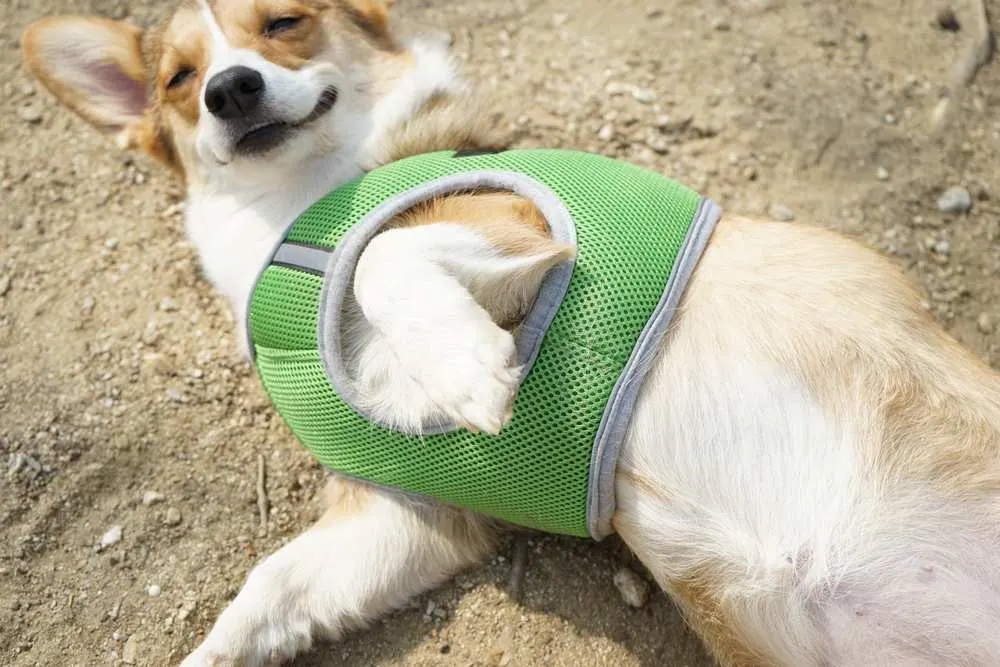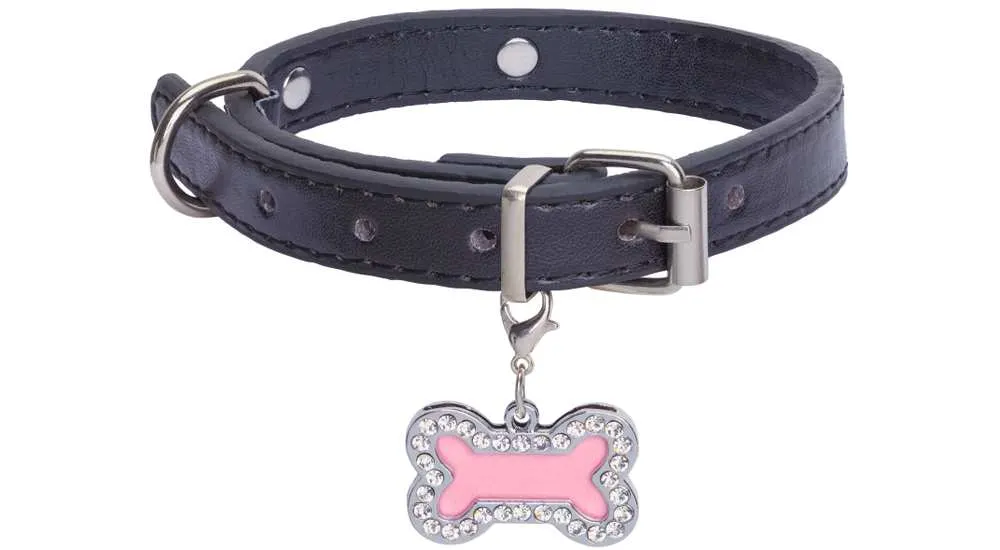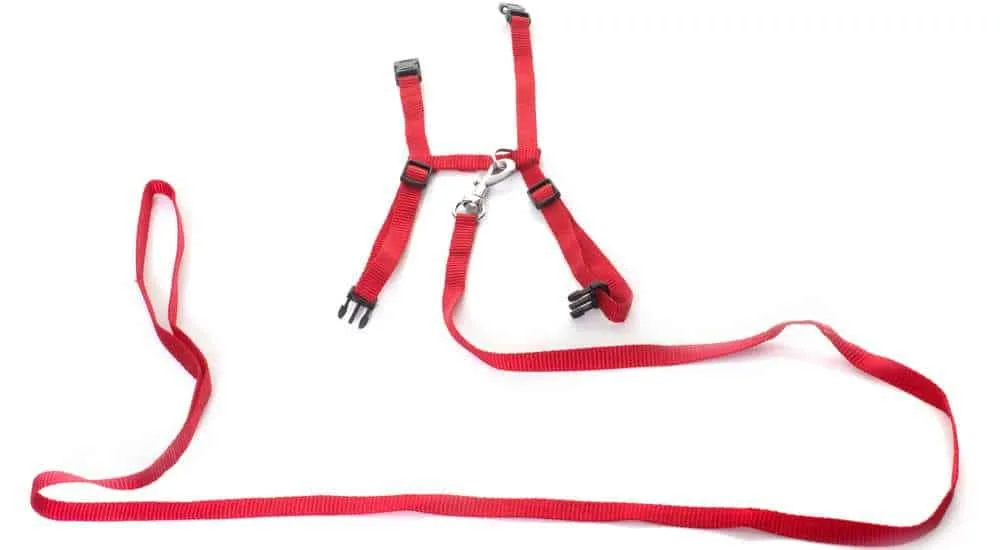We’ve all been there. Instead of you walking your corgi, your corgi is walking you.
The pulling, the choking sounds, everybody looking at you weird since your 25-pound corgi is clearly stronger than you, dragging you along as he/she pleases.
Well, you had enough, and you decided it’s time to buy a harness and teach that cute little ball of fur who’s the boss.
But will harness help, and does the type of harness play a role if you eventually decide to buy it.
Those are the questions we’ll answer in today’s article called: “Do corgis need a harness?”
We’ll try to be thorough while still remaining relatively faithful to the topic. After all, we don’t want you spending your hard-earned cash for nothing.
Let’s get into it.

Do Corgis Need A Harness?
Well, we’d argue they do. It mostly depends on the situation and on your corgi’s personality and leash manners. However, some owners might not benefit that much, or at all, from a harness.
If you think your corgi needs a harness, then this article probably won’t change your opinion. If you’re still in the decision process, then we’ll do the best we can to help you come to the right decision.

Collar Vs. Harness (Pros And Cons)

Collar
PROS
Collars are far more practical compared to harnesses. They can be on your dog 24/7, and your pup won’t mind. They also carry your dog’s ID, which is essential if he/she gets lost.
CONS
Number one problem with collars is that they can cause neck injuries. When a dog starts pulling the leash, even just a slight pull, it can cause an injury to their windpipe or thyroid gland. Don’t get us started on hard yanking when he or she runs after something.
Try to avoid choke and pronged collars. Martingale collars are the safest ones since they gradually tighten as your dog starts pulling on the leash, preventing him from slipping out of it.

Harness
PROS
A harness is definitely a safer option compared to a collar.
Firstly, instead of concentrating all the energy on your dog’s neck, it gets dispersed across his back or chest, relative to the harness design. This means the risk of injuring your dog’s neck, thyroid gland, or trachye is significantly reduced.
Secondly, a harness will definitely offer more control compared to a collar. Will mention the exact situations when your dog would benefit from a harness.
Another rather important pro of harnesses is that they don’t cause your dog to have negative associations. What do we mean by that?
Well, when your dog is on a collar, and it sees another dog or a person they really want to sniff or hang with, they’ll instinctively start pulling.
If they pull too hard, the collar will cause them pain; the more often this happens, the more negative association gets imprinted into your dog’s memory.
Even though they might be really social and playful, they’ll hesitate to do anything since pain will follow when they see someone else.
This doesn’t happen with a harness. Even if the dog starts pulling, they won’t feel any pain, they might not get what they want, but it won’t traumatize the little thing.
CONS
The practicality of a harness can’t be compared to the practicality of a collar.
A collar you can leave on for as long as you like, a harness not so much.
Most dogs don’t enjoy having a harness on them all the time; they tolerate it during a walk, but not that much afterward.
Also, a harness will definitely ruin the aesthetics as they make most dogs look cumbersome.
Keep in mind a harness won’t necessarily fix all the behavioral issues a dog might have.
Sure, the pulling won’t get them anywhere. However, suppose they still have a tendency to jump on anyone and everything they see.
In that case, that will nevertheless still keep happening.

Your Corgi Needs A Harness If
You Want To Train Your Puppy
Corgi puppies are the cutest, but they can also be reasonably clumsy.
If your puppy is clearly having a hard time learning how to walk on a leash and getting tangled up all the time, a harness can be a good option.
After they get used to being led, you can slowly switch over to a collar since it is a relatively more elegant option.
Just keep in mind, if you’re buying a harness for a puppy, you definitely don’t need to overspend since they’ll grow out of it reasonably quickly.
They Don’t Behave On The Leash
Let’s face it, not every dog is a good boy. Corgis tend to be a fairly temperamental breed.
If you don’t’ train them right since their very early age, you could be dealing with a dog that doesn’t respect authority.
When that’s the case, every walk around the block can turn into a potential tug of war and seeing who can win.
If that’s the case, setting aside the collar and investing in a harness could do wonders.
When dogs wear a collar and start pulling the leash, even though it hurts them and they’re clearly choking, they’re getting what they want – they’re moving forward.
A harness negates the moving forward part; the dog isn’t getting anything from pulling since the harness dissipates all the energy. When he realizes that, eventually, he stops pulling (in most cases).
Are Good At Wriggling Out Of A Collar
Some dogs are very good at being an escape artist.
One minute they have their collar on, and everything’s fine. The next minute you’re panicking since your dog managed to slip out of its collar into the wild. Well, with a harness, your little friend isn’t going anywhere.
Some corgis are on the smaller side and also have that individualistic, adventurous gene. Combining those two traits can make them want to wriggle out of their collar every now and then.
There aren’t necessarily improperly behaving on a standard leash; they’re just very rarely on it for you to judge. Don’t hesitate, and get the harness; you don’t want your dog roaming around alone.
Older Corgi With Needs
Unfortunately, corgis can suffer from hip dysplasia and joint issues. This can make your corgi a little less mobile than usual. These are mostly progressive conditions. At some point, your corgi might have problems getting up on its own.
Having a harness that will let you assist them is a great way to spare your furry friend some trouble. Pulling a dog by a collar can cause discomfort and pain; harnesses are much better in this respect.

Your Corgi Doesn’t Need A Harness If
You Got A Big Backyard
Although it isn’t very common, some corgis are fortunate enough to have a huge backyard to play in. If that’s the case with your corgi buying a harness could be unnecessary.
As long as they get all the activity they need in the backyard.
She/He Is A Good Girl/Boy
If your corgi has shown time and time again they know how to behave with just a leash and collar, then putting a harness on them might just be a waste of time and money.
Harnesses are designed mostly for dogs who have relatively low self-control. Just be happy that’s not the case with your dog.
Types Of Harnesses

Front-attaching
Front-attaching harnesses are becoming more and more popular. Some owners swear by them, promising instant results. But why is that?
Well, they definitely discourage your dog from walking in front of you.
As the leash is attached to the front of a front-attaching harness, directly to your dog’s chest area, if they pull, they’ll only find themselves pulling more towards you, probably the opposite of what your pup wanted.
Also, since dogs are so low to the ground compared to us, their center of gravity is much more stable compared to ours.
This gives them an advantage over us when it comes to pulling. Even your 25-pound corgi can move a full-grown 190-pound man if it really wants to.
Front attaching harnesses lets the leash attachment point be close to your dog’s center of gravity, giving you a lot more control over them compared to a collar or even a back- attaching a leash.

Back-attaching
Back-attaching leashes are often cheaper compared to their front-attaching counterparts. That’s why we’ll list some of them in our “harness suggestions” down below.
Are they worse compared to front-attaching harnesses? Yes, they are. Are they useless? No.
If you already have one or you don’t mind your dog pulling a bit every now and then, you shouldn’t worry; back – attaching harnesses are fine—especially for dogs who aren’t causing you any trouble.
Plus, if it’s 6 in the morning and you haven’t had your first coffee yet, having a dog do all the work for you by pulling you forward isn’t the worst thing ever.

Don’t Expect Miracles!
We said some pretty amazing things about harnesses so far, and we stand by those, but there are a few caveats.
If your dog is just bad at behaving, period, you could put a harness from Rudolf the reindeer and use Wonderwoman’s leash, and you still wouldn’t change your dog overnight.
If your dog has behavior issues, take them to a trainer, a well-experienced trainer. A harness is a useful training tool, but it can’t replace actual training with someone who knows what they’re doing.

Some Harness Suggestions To Consider
1. Bolux Dog Harness
You want a harness, but you don’t want to spend more than you do for a coffee and a bagel? Look no more. Bolux Dog Harness has all you could ever ask from a harness. Is it the best looking harness ever? No, it’s not. But it does the job. It might not last throughout your dog’s entire lifetime, but it won’t certainly won’t fail you after a few walks.
Bolux dog harness is a back-attaching harness.
2. PoyPet Harness
Another affordable harness, this one, though, is front-attaching. For a few more bucks, you get all the benefits we mentioned of a front-attaching harness. Is it a looker? Not really, but beauty is in the eye of the beholder and in the eye of the wallet holder.
If you don’t care that much about your corgi having the coolest looking harness out there, this one should do more than fine.
3. Rabbitgoo Dog Harness
Now, for almost double the price of the first harness we listed (which still isn’t that much), you can buy something a little more stylish. Rabbitgoo dog harness is a double leash attachment harness. That means you have both front and back attachment options.
It’s a few dollars more expensive compared to the first two options. Still, it definitely looks better, especially on a corgi.
4. Auroth Tactical Dog Training Harness
Okay, we know what it says, but hear us out. This one is by far the best quality harness for your corgi. Even though it has tactical in its name, like your dog is about to go in a warzone, it’s actually a pretty good looking harness with a lot of color options.
Like the rabbitgoo harness, it also has both front and back attachment options. If you don’t mind spending a few extra bucks on something with more quality, the Auroth Harness is a great option.

Are Harnesses Bad For Corgis? – Conclusion
We’ve covered a lot in this article, maybe even more than we planned, but all of it was relevant for the topic.
All in all, there are more benefits to your corgi having a harness than not having it.
Collars are a lot more practical, but they’re also more dangerous compared to harnesses, mainly for corgis that aren’t that obedient.
There are a few instances where your corgi might not need a harness. If they’re really, really good at behaving on a leash attached to a collar, then they don’t need a harness.
Any other situation and a harness is the way to go.
Keep in mind, though, after you’re done with the walk or whatever activity you did with your dog that involved a harness, takes the harness off of them. Dogs don’t enjoy having something as cumbersome as a harness strapped to their body 24/7.
Read Also: Are Corgis Good Off Leash?

